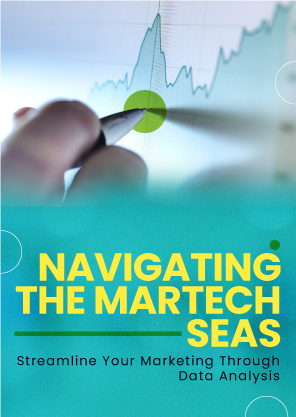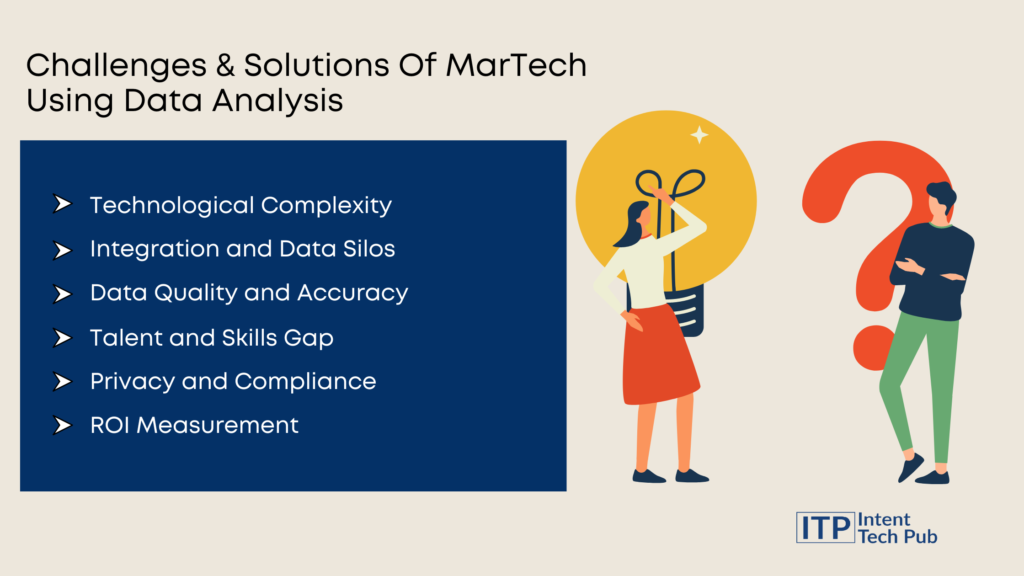or call: +1 (845) 347-8894

or call: +1 (845) 347-8894
or call: +1 (845) 347-8894

“Information is the oil of the 21st century,
-Peter Sondergaard
And analytics is the combustion engine.”
In the fast-paced world of B2B marketing, it is crucial to keep up with the latest trends in order to achieve success. The implementation of B2B marketing technology and data analysis is where the true potential lies. Through the utilization of cutting-edge technology and the application of data-driven insights, your business has the ability to tap into previously unexplored opportunities, fine-tune marketing tactics, and achieve outstanding outcomes.
B2B marketing technology, commonly known as MarTech, encompasses a diverse array of tools, software, and platforms that are specifically designed to optimize marketing operations, enhance customer engagement, and boost revenue growth. MarTech stack provides a wide range of solutions that can help streamline marketing processes, improve targeting, and deliver personalized experiences. These solutions include marketing automation, customer relationship management (CRM) systems, content management platforms, and data analytics tools.
Your B2B business can achieve remarkable outcomes and gain a competitive edge by effectively integrating the right MarTech solutions into your marketing operations. The adoption of MarTech, however, marks only the initial phase. The true potential lies in leveraging data analysis to extract practical insights and facilitate data-driven decision-making. Through proficient analysis and interpretation of data, you can reveal significant patterns, comprehend consumer actions, and enhance your marketing tactics to achieve optimal outcomes for your business.
Leveraging data analysis enables you to gauge the effectiveness of your marketing efforts, accurately pinpoint your target audience, and consistently improve the campaigns to achieve outstanding outcomes. In today’s digital age, businesses can leverage a powerful combination of B2B marketing technology and data analysis to unlock new growth opportunities, foster stronger customer relationships, and drive sustainable business growth.
Below given is a closer look at the significance and benefits of B2B marketing technology.

B2B marketing technology offers a plethora of tools and platforms that aid in making strategic decisions. By leveraging real-time data insights and analytics, businesses can gain valuable insights into customer behavior and identify emerging trends. Armed with this information, companies can make informed decisions to optimize their targeting, messaging, and overall marketing strategies, ultimately driving better business outcomes.
MarTech is a powerful tool that enables businesses to streamline and automate their marketing processes. By leveraging MarTech, you can save valuable time and effort while achieving your marketing goals more efficiently. B2B marketing technology streamlines intricate tasks, empowering marketers to concentrate on value-driven activities and achieve superior outcomes. From lead generation and nurturing to campaign management and analytics, this technology simplifies the process.
By leveraging data analysis, B2B marketers can effectively craft personalized experiences on a large scale. Through the collection and analysis of customer data, companies have the ability to segment their target audience, customize messaging, and provide pertinent content across multiple touchpoints. The implementation of personalization techniques has been shown to have a significant impact on user engagement, trust-building, and conversion rates.
The adoption of MarTech has enabled B2B marketers to enhance their comprehension of their customers. By conducting data analysis, you can gain valuable insights into the preferences, pain points, and behavior patterns of your customers. With this valuable insight, you can fine-tune your products/services, elevate the quality of your customer interactions, and establish enduring connections with your client base.
The integration of B2B marketing technology and data analysis has enabled businesses to achieve precise tracking and measurement of their marketing endeavors. By implementing advanced analytics tools, you have the ability to monitor and measure your business’s crucial performance metrics, assess the effectiveness of marketing campaigns, and accurately attribute revenue to particular marketing efforts. By adopting a data-driven approach, you can enhance your strategies, efficiently allocate resources, and showcase a quantifiable return on investment (ROI).
Incorporating B2B marketing technology and data analysis into your business strategies can provide a distinct advantage over competitors. With the help of advanced technology, your business can gain a competitive edge, effectively reach the desired audience, and execute powerful marketing initiatives. To remain competitive in the constantly changing B2B industry, it is crucial for you to adopt new technologies and leverage the potential of data.

The advent of B2B marketing technology and data analysis has brought about a significant transformation in the manner in which businesses approach their marketing strategies. Although the integration and optimization of MarTech and data analysis offer numerous benefits, they also present certain obstacles that must be overcome.
Below discussed are various challenges that may arise and explore effective solutions to ensure success:
Challenge: The realm of B2B marketing technology can prove to be intricate and daunting, given the extensive range of tools and platforms at one’s disposal. Choosing the appropriate technologies that are in line with your business goals can be an intimidating task.
Solution: To effectively address your marketing needs, it is recommended to adopt a strategic approach. This involves conducting comprehensive research and seeking advice from industry experts to identify the most appropriate MarTech solutions for your business.
Challenge: Integrating different marketing tools and systems can be a challenge for many organizations, leading to the creation of data silos. The lack of integration among data sources can impede the capacity to obtain a comprehensive perspective of marketing endeavors and consumer intelligence.
Solution: For a streamlined data management experience across various platforms, it is recommended to consider investing in MarTech solutions that provide seamless integration capabilities. To establish a cohesive data ecosystem, it is essential to adopt strong data governance measures that can effectively eliminate silos.
Challenge: The quality and accuracy of the collected data plays a crucial role in data analysis. Erroneous insights and ineffective decision-making can result from incomplete or inconsistent data.
Solution: To ensure the accuracy and reliability of data, it is essential to establish data quality management processes. These processes should include regular data cleansing, validation, and verification. By implementing these measures, you can maintain high-quality data that is free from errors and inconsistencies.
By incorporating these processes into your data management strategy, your business can make informed decisions based on trustworthy data. To maintain the accuracy and consistency of data, it is crucial to establish uniform data collection protocols and leverage data validation software.
Challenge: Effective B2B marketing technology and data analysis demand the expertise of skilled professionals who can adeptly navigate its complexities. Acquiring and maintaining a skilled workforce can prove to be a daunting task.
Solution: To maximize the potential of your marketing team, consider investing in training and upskilling programs. These initiatives can provide your team with the necessary knowledge and skills to effectively leverage MarTech and data analysis tools. By empowering your existing team, you can enhance their capabilities and drive better results for your business. Or you can also opt for a third-party consulting who specializes in the same.
Challenge: In today’s digital landscape, businesses face the daunting task of complying with data protection laws, including GDPR and CCPA, amidst growing concerns over data regulations and privacy. Meeting these requirements can prove to be a significant challenge.
Solution: It is crucial to remain up-to-date with the constantly changing regulatory environment and establish strong measures for data privacy and security. It is imperative to obtain appropriate consent for the collection of data and maintain transparency in your data practices. It is advisable to seek the assistance of legal counsel or data protection officers to guarantee adherence to pertinent regulations.
Challenge: Calculating the ROI of B2B marketing technology and data analysis initiatives can prove to be a daunting task, particularly when it comes to assigning revenue to individual marketing endeavors.
Solution: It is essential to establish clear Key Performance Indicators (KPIs) and measurement frameworks to effectively track the impact of your marketing technology investments. Use advanced analytics software to track customer journeys and attribution from initial contact to final conversion
Challenge: New technologies and data-centric methods often require a firm culture change. Change resistance and stakeholder buy-in can hamper implementation.
Solution: Any company implementing new procedures needs a solid change management plan. This approach should emphasize clear communication, thorough training, and a gradual switch to the new system. The organization can ensure a smooth change by following these measures. Communication and training will keep stakeholders informed and engaged, and employees will learn the new system. Finally, a gradual transition will help integrate the new processes without affecting productivity or efficiency. Stakeholders at all levels must be informed about MarTech and data analysis’s benefits and long-term value.
In today’s dynamic marketplace, businesses seeking to thrive have found MarTech and data analysis to be indispensable. In conclusion, these tools have become essential for companies looking to stay ahead of the curve. Incorporating MarTech solutions and implementing data insights can open up new possibilities, fuel expansion, and lead to exceptional business accomplishments.
To fully leverage the capabilities of B2B marketing technology and data analysis, it is essential to recognize and tackle the obstacles that come with them. To achieve success, it is essential to adopt a proactive mindset, encourage a culture of continuous learning, and utilize the knowledge and skills of experts to overcome challenges. By leveraging the potential of B2B marketing technology and data analysis, your business can establish itself as a trailblazer in the industry. Keep up with the latest trends and stay ahead of the curve by adopting these cutting-edge tools.
